Demolished Eiffel Tower. Mass executions. Monuments razed to the ground. Hitler ordered his troops to defend Paris to death. In the event of a defeat, the French capital was to be wiped off the face of the earth. However, the Führer did not foresee that the general who was supposed to do it would help save the city ...
In the second half of the 19th century, the French themselves demolished half of Paris's buildings and rebuilt their capital on their ruins. This great reconstruction created the beautiful Paris as we know it. Less than a hundred years later, it was in danger of real destruction.
The Nazis planned the destruction of Paris in the event of the retreat of their troops from France as early as 1942. Demolition specialists intended to carry out this in two stages. First, gas, electricity and water networks were to be destroyed. Then industrial plants. Next on the list were bridges over the Seine, as well as major government buildings and historic buildings. Even the famous symbol of Paris - the Eiffel Tower - was to be destroyed.
New military commandant of Paris
At the beginning of August 1944, Adolf Hitler personally dismissed the new commandant of Paris, General Dietrich von Choltitz. The Führer emphasized that the loss of the city would have a disastrous effect on the morale of the German army and citizens. Therefore the French capital had to be turned into a fortress and ruthlessly maintained by all means . If this were not possible, Paris would be razed to the ground.
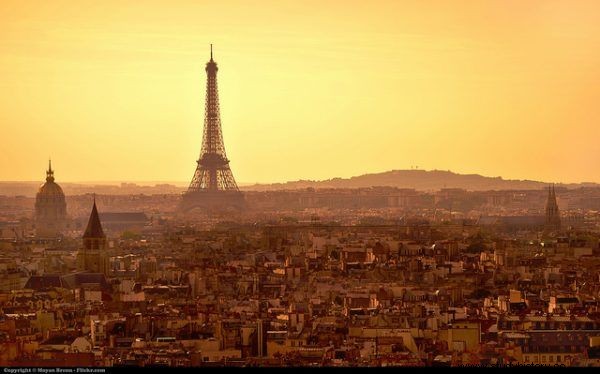
The glamor of Paris might have faded away forever (Photo:Moyan Brenn, CC BY 2.0).
General von Choltitz arrived in Paris on August 7. This event was witnessed by Raoul Nordling, the Swedish Consul General. In his memoirs, the new commandant "was a corpulent man with a Martial appearance, broad in the shoulders, extremely formal in demeanor and looking like a terrible Prussian" . Nordling did not think then that he and the German general would become the providential men of the French capital.
German general and Swedish diplomat
General von Choltitz himself was not too happy about taking up the new position. He had doubts, he was burdened with responsibility. He was a front man, especially famous in the battles for Sevastopol, meanwhile he was to become the gravedigger of one of the most famous cities in the world.
He recalled having had nightmares, one in particular of which was terrifying. He saw his corpse hanging in the ruins of Paris ...

The article is based, inter alia, on for the book by Antony Beevor "Paris Liberated".
Raoul Nordling, 62, was an experienced diplomat. He worked at the post in Paris from 1905. In 1926 he became the Swedish consul general, replacing his deceased father in this position. Throughout all these years, he got to know the French realities perfectly, including those under the occupation. Now he skilfully maneuvered between the Vichy government, the Allies, the German occupation authorities and the French resistance.
Face to face
The first personal meeting of the two gentlemen took place on August 16, 1944 at the Hotel Meurice, where the commandant's staff was located. Nordling came to negotiate the release of nearly 4,000 French political prisoners who were to be deported to the Third Reich.
It was a real display of diplomacy from both sides. Despite the German's initial resistance, the gentlemen made a deal. General von Choltitz agreed to free the prisoners in exchange for ... 20,000. German prisoners of war. Where the Swedish diplomat was supposed to get them will probably remain a secret forever. The prospects for a fruitful future collaboration seemed very real.
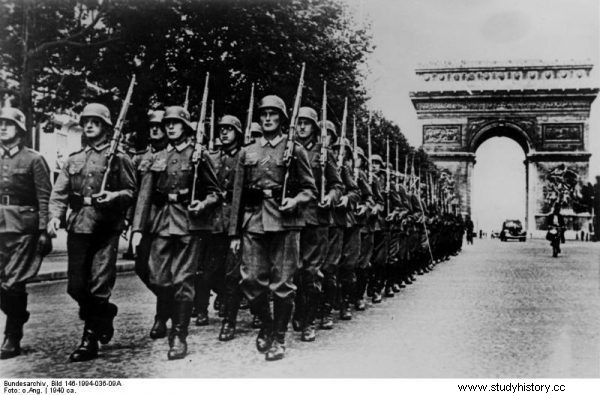
Why were trees planted on the Champs Elysees? It could have been the last military parade at the Arc de Triomphe (photo:Bundesarchiv, Bild 146-1994-036-09A / CC-BY-SA).
Vive la France!
For some time now, the residents of the French capital had been feeling tension, excitement caused by the sight of the retreating Germans and the awareness of the proximity of the Allied troops. In the town itself, a garrison of 16,000 was left under von Choltitz.
On August 15, the Paris policemen rebelled against Germany, their former masters. From that moment on, shots were fired more and more frequently in the city. The population and resistance fighters were erecting barricades and attacking German outposts. French national flags hung on the buildings.
As Antony Beevor wrote in his book "Paris Liberated" on August 18 alone, "a total of 40 Germans were killed and 70 injured, while Parisians recorded 125 deaths and nearly 500 wounded."
The general gives an ultimatum
Under these circumstances, on Saturday, August 19, Nordling and von Choltitz met again. The general was restless, thrashing around his staff like a wild beast in a cage. Nordling recalls that "it was alternately jovial, passionate, cursing like a shoemaker".
The German told the Swede that an uprising broke out in the city and now he was forced to strike the prefecture of the police with armored units. At the same time, expressed his regret that he would go down in history as the one "who destroyed Paris " . The Swedish consul then asked him to refrain from acting until he communicated with the resistance movement.
The fighting stopped temporarily, but started again on August 20. The German commandant then issued an ultimatum to the insurgents : " they will either stop their attacks or he will order the bombing of Paris ”.
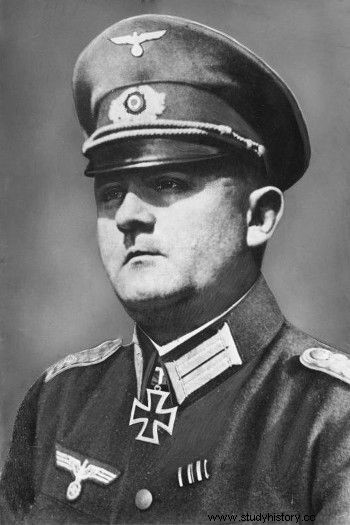
Dietrich von Choltitz, the man who saved Paris (Photo:Bundesarchiv, Bild 183-2003-1112-500 / CC-BY-SA).
Nordling proposed to send cars equipped with the so-called "Barkers", which were to inform Parisians about the conditions of the ceasefire. Its main decision was to be recognized by the German city commander of the insurgent government in Paris in return for stopping shooting at German soldiers.
General von Choltitz was under heavy pressure. Chief of Staff of the OKW General Alfred Jodl called him asking why nothing had been blown up in Paris yet? At the same time, the communist militias rejected all possible negotiations with " boszami" .
Getting out of the situation?
There was an impasse. The French ignored the ceasefire proposal, the Germans did not intend to submit it, and von Choltitz concluded that he must carry out the orders received. As he told Nordling, "I will never give up on an irregular army."
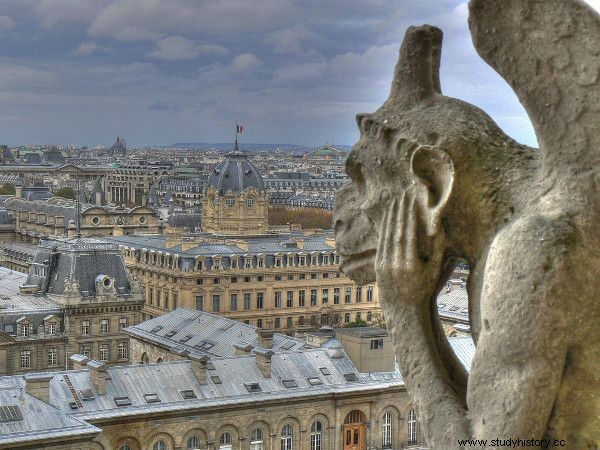
This gargoyle is still worried about German plans towards Paris (photo:JAc 82, CC BY 2.0).
The word "irregular" immediately caught the attention of the Swedish consul. He suggested to the general that if he did not want to surrender to the insurgents, let him surrender to the Allies. He also offered to undertake a negotiating mission.
Von Choltitz not only agreed to the Swede's proposal, but also assigned him his officer so that he could safely cross the front line. At a decisive moment, Nordling suffered a heart attack and was hospitalized. Luckily his brother Rolf has replaced him.
Secret Swedish diplomacy mission
On Tuesday evening, August 22, a Citroen, bearing the flags of Sweden, and five men in it, left for the position of the Allied forces. Among them, Rolf Nordling, a representative of the Paris insurgents and an associate of General de Gaulle.

The article is based, inter alia, on for the book by Antony Beevor "Paris Liberated".
The delegation reached General Bradley's headquarters in Laval. When the American found out about the situation in the town, immediately directed the French 2nd Armored Division of General Leclerc towards Paris. At the same time, the American 4th Infantry Division was to attack the city.
Paris finally free!
In the evening of August 24, General Leclerc's armored troops reached the outskirts of the city. Around midnight, they occupied the town hall. An hour later, all the church bells rang all over town. Paris announced its liberation to the world.
The next day, after a short fire exchange, French soldiers seized the headquarters of General Dietrich von Choltitz. Two French officers entered his office. "Sprechen Sie Deutsch?" one of them asked. "Presumably better than you," replied the general.
The French transported the former Paris commander to the police prefecture, where he was to sign the surrender in the presence of Leclerc. Von Choltitz - as Antony Beevor wrote - " on the way saw some Parisians spitting at the sight of him ”. After all, the German general was one of those who greeted General de Gaulle at the Montparnasse train station.
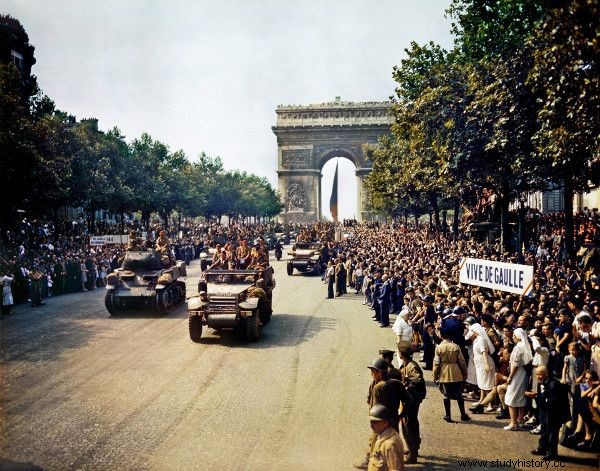
The crowds welcoming General Leclerc on the Champs Elysees did not know how close it was to the destruction of their city.
The uprising in Paris was successful. The city avoided major damages. Precious monuments have survived. It is a great merit of both General von Choltitz, who ignored Hitler's orders and sought agreement with his opponents, as well as Roula Nordling. How tragic the fate of the insurgent Warsaw is drawn against the background of the events in Paris.
